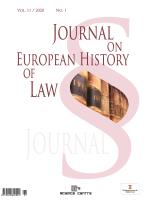„Zurück in die Zukunft“: Österreichs staatsrechtliche Zeitreise im Jahr 1945“
Back to the Future: Austria’s Constitutional Time Travel in 1945
Author(s): Christian NeschwaraSubject(s): History, Law, Constitution, Jurisprudence
Published by: Evropská společnost pro právní dějiny, z.s.
Keywords: Allied Committee in Austria; Allied Control in Austria; Allied Declaration on Austria 1943; Austrian Federal Constitution of 1920; Austrian Provisional Constitution of 1945
Summary/Abstract: In the course of 1945 a striking change of the constitutional status happened in Austria: At Easter, when the Red Army was crossing the border in the southeast of Austria, the way was paved for terminating the national-socialist rule, which was in effect since the „Anschluß“ in March 1938. Austria, now renamed „Ostmark“, perished as a subject of international law, it was totally integrated in the organisation of German Empire. In 1940 the historical structure of Austria’s Länder was completely modified with the establishment of „Reichsgaue“, following the pattern of the territorial structure of the NSDAP. Due to the Declaration of the Allied powers in autumn 1943 at Moscow about the re-establishment of Austria’s sovereignty the way was paved for an independent state authority in her eastern Länder - with personal benevolence from Stalin. On behalf of the Soviet occupation forces the formation of a Provisional State Government took place, consisting of members delegated by the new antifascist political parties under the leadership of Karl Renner; he served as State Chancellor. Citing the Moscow Declaration, they ordered to set up Austria „in the spirit of the Constitution of 1920“. Lacking democratically legitimated organs a Provisional Constitution had to take the place of the Federal-Constitutional Law of 1920. At first Austria was built up as a decentralized unitary state. Following the occupation of the western national territory of Austria by the western Allied forces until summer of 1945, in the course of Länder-conferences in September the agreement of the political parties in western Austria was reached about the legislative activities taken by the Provisional State Government at Vienna. Due to the recognition by the Allied Committee in October 1945 the Provisional State Government was able to organize general elections in next month. After appointment of all organs provided by the Federal-Constitutional Law the Provisional Constitution was abrogated in December 1945; this did not meet the approval of the Allied Council, due to his demand to draft up a new constitution. The constitutional change was accompanied by an abruptly renunciation of Austrian citizens from the former self-image based on the idea of 1918 about belonging to the German nation, which was replaced by a growing attention to a new awareness about Austria as their nation.
Journal: Journal on European History of Law
- Issue Year: 11/2020
- Issue No: 1
- Page Range: 2-13
- Page Count: 12
- Language: German

